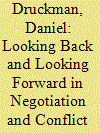| Srl | Item |
| 1 |
ID:
172312


|
|
|
|
|
| Summary/Abstract |
In this article, I look back primarily at the research accomplishments made by my various collaborative teams to date and look forward toward the gaps that remain to be filled. Key insights and gaps are discussed on five research topics: group attachments and representation, turning points, social justice, values and interests, and conceptual learning. A concluding section highlights key discoveries that provide fertile ground for new research. Examples include the pulls and pushes of stakeholders, the role played by crises in producing turning points, connecting micro- to macro-level processes, the link between values and identities, and the thought processes that are encouraged by design activities. Further, advances in methodologies contribute to the next generation of studies on negotiation and conflict.
|
|
|
|
|
|
|
|
|
|
|
|
|
|
|
|
| 2 |
ID:
125112


|
|
|
|
|
| Publication |
2013.
|
| Summary/Abstract |
Using a simulated bilateral negotiation over several security issues, the authors explore how variations in the negotiation context influence reactions to a negotiating crisis. Negotiators were primed to focus on one of three aspects of the context: transaction costs, dependence, or shared identity. They were asked to respond to the crisis with a decision to reach an immediate agreement, continue negotiating, or reframe the issues. The results showed that mutual dependence (unattractive alternatives) led to reframing (turning points) whereas high transaction costs led to a preference for continuing the negotiation. Shared identity did not affect negotiators preference across alternative courses of action. Affective trust amplified the impact of dependence and transaction costs: the decision to reframe was made more often by negotiators who reported low affective trust, whereas the decision to reach immediate agreement was made more often by negotiators who reported high affective trust. High cognitive trust encouraged negotiators to continue the negotiation if they had a shared identity or if transaction costs were high. Applications were made to real-world cases and implications were developed for Relational Order theory and for further research.
|
|
|
|
|
|
|
|
|
|
|
|
|
|
|
|
| 3 |
ID:
113955


|
|
|
|
|
| Publication |
2012.
|
| Summary/Abstract |
Application of a turning points analysis to detailed chronologies of events that transpired prior to and during two matched cases of multilateral intellectual property rights (TRIPS) negotiations yields useful lessons for understanding negotiation process and effective negotiator behavior. The unfolding negotiation process is traced in the GATT Uruguay Round and prior to and during the WTO Doha Ministerial. Departures from earlier trends in the chronologies merit special attention. A departure is defined as a clear and self-evident change from earlier events or patterns in the form of an impactful decision taken by one or more parties. By coding the causes (precipitants) and effects (consequences) of the departures, we perform a turning points analysis. The turning points analysis, composed of three-part sequences, reveals the triggers and impacts of departures during the extended TRIPS negotiation process. The analyses will allow a comparison of the patterns that unfolded during the two phases of TRIPS negotiations, which will highlight the breakthroughs that occurred during the Uruguay Round and the crises that emerged later, prior to and during the Doha Ministerial. Improving the effectiveness of multilateral trade negotiations depends in part on understanding how critical turning points emerge.
|
|
|
|
|
|
|
|
|
|
|
|
|
|
|
|